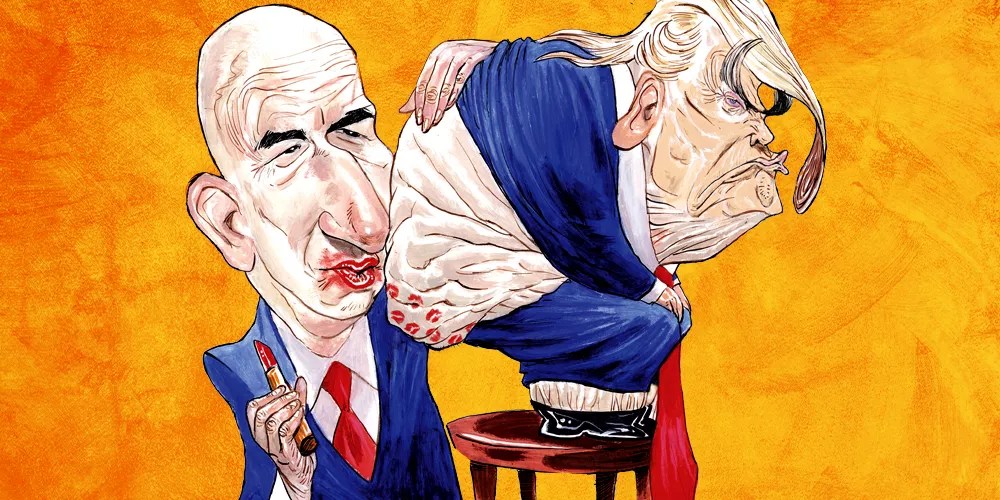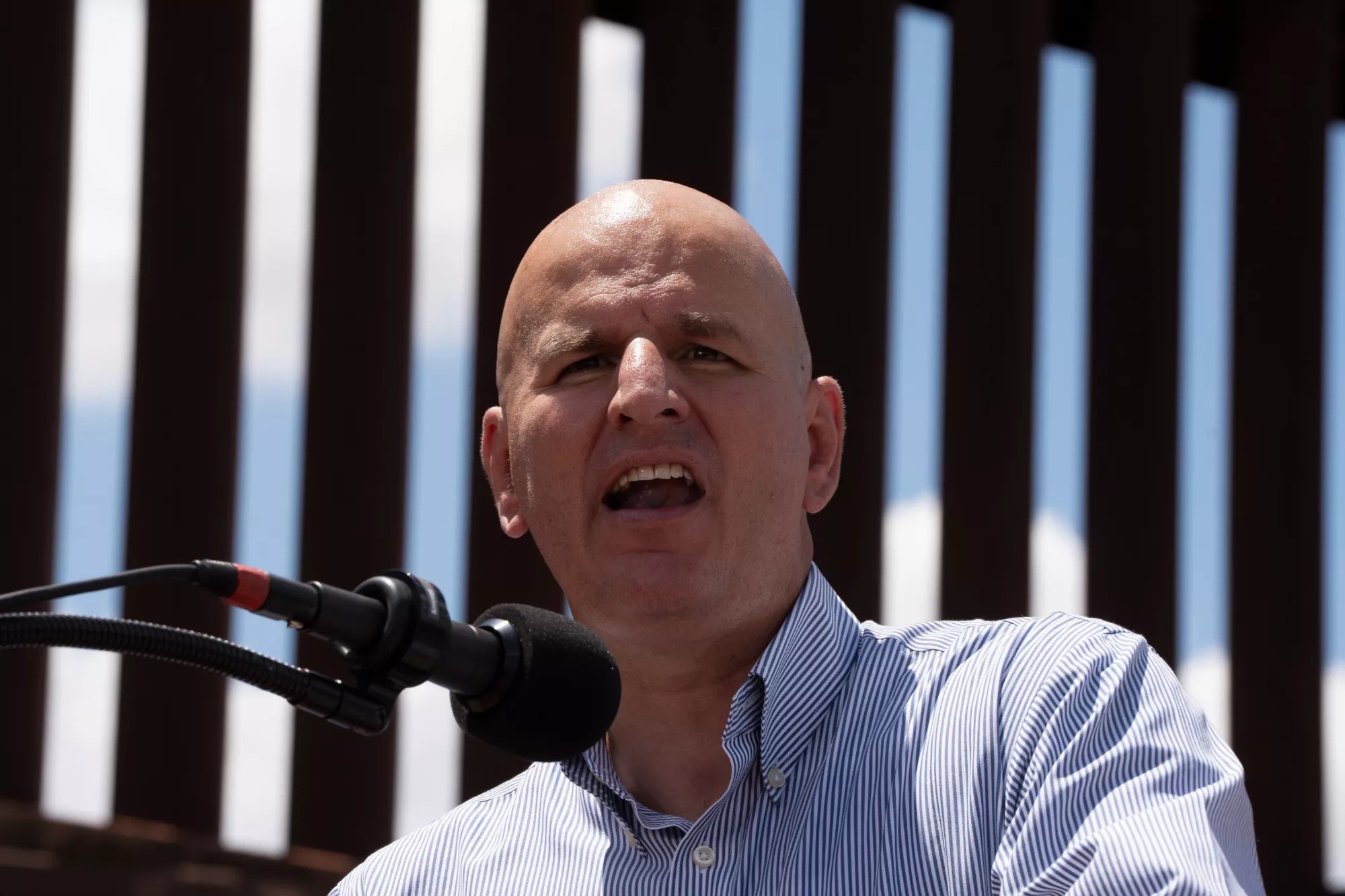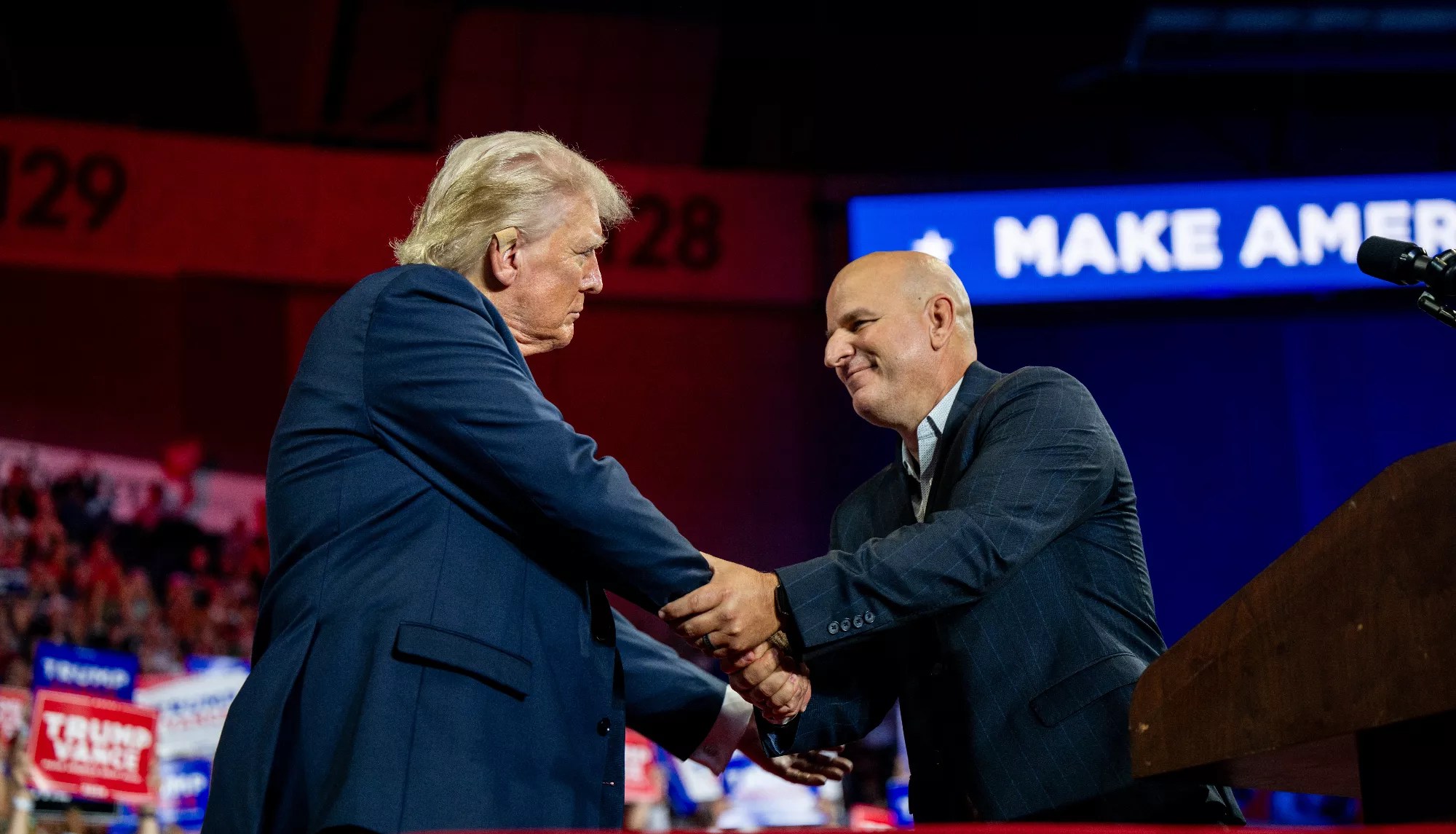
Illustration by Greg Houston

Audio By Carbonatix
Squinting, his thumbs hitched into the waist of his beige chinos, Brandon Judd stood next to Donald Trump, prepared to plant a sloppy one.
It was February 2024, and Trump was in Texas to mercilessly flog border security as he ran to regain the White House. The tiny border town of Eagle Pass had become a flashpoint in the immigration debate, with Texas Gov. Greg Abbott seizing a park adjacent to the Rio Grande and erecting barbaric makeshift barriers nearby, including concertina wire and a mid-river flotilla of giant orange buoys separated by circular saw blades.
On Abbott’s orders, the Texas National Guard reportedly was denying the Border Patrol access to the park, even for humanitarian reasons. That policy allegedly contributed to the drowning deaths of a mother and her two children as they attempted to traverse the waterway.
Border Patrol agents were “pissed,” Judd told reporters that day, and he was in a good position to know. The Arizona-reared Judd was the president of the National Border Patrol Council, the union that represents more than 16,000 line agents and support staff. But those agents weren’t pissed because Abbott’s soldiers were denying them the ability to process migrants, Judd said. They were angry because “President Biden’s policies continue to invite people to cross here.”
“Thank goodness,” he added, “we have somebody that’s willing to run for president of the United States, forgo everything else that he’s been doing, to serve the American people.”
That statement offered a uniquely obsequious appraisal of Trump’s motivations – at the time, “everything else he’s been doing” amounted to facing federal and state prosecution, which Trump’s election win successfully neutered. But it was also the type of MAGA ass-kissing at which Judd had become particularly practiced.
For years, Judd had trafficked in the same alarmist, nativist rhetoric that had become a trademark of Trump’s politics. He’d spewed it in front of Congress and dozens of times on Fox News, using the imprimatur of his union office to promote hatred of migrants. Though the Border Patrol union is made up of agents of all political stripes, Judd gleefully doled out its endorsement to mostly Republican candidates who leveraged tensions over immigration to advance their political careers.
Judd, it appears, was doing the same. After nearly a decade as a union honcho, he resigned in May 2024 and became a frequent campaign surrogate for Trump, appearing at rallies in Arizona and North Carolina and remaining a constant critic of Trump’s opponents on conservative outlets. In December, a month after Trump trounced Kamala Harris at the polls, Judd got his reward.
Trump announced he was nominating Judd to be the next U.S. ambassador to Chile, praising Judd for having “helped me develop and implement the most effective Border Security policies in our Nation’s History.” Pending the approval this fall by the full Senate, Judd’s retirement from the agency he first joined nearly three decades ago likely will be crowned both with his Border Patrol pension and a sweet gig in one of the richest countries per capita in Latin America.
It’s quite the payoff for a man who entered the Border Patrol shortly after graduating high school in the small Cochise County town of St. David. The rise of the 52-year-old Judd – from lowly agent to de facto face of the agency to intimate of Trump and now future ambassador – mirrors the trajectory of so many in Trump’s orbit who have calculated that access to power is worth the abhorrent anti-immigrant views one must promote to obtain it.
As Judd prepares for a cozy few years in South America, his ascendancy just goes to show: Snuggle up next to an aspiring dictator, and the sky is the limit.

Brandon Judd began his Border Patrol career in 1997 and spent a good portion of it stationed in southern Arizona.
Rebecca Noble/Getty Images
Blind ambition
Judd’s story begins in St. David, a sleepy, overwhelmingly white and Mormon hamlet of less than 2,000 people about an hour southeast of Tucson. The town was founded in 1877 by a group of settlers sent from Utah by Brigham Young, president of The Church of Jesus Christ of Latter-day Saints, and named for David W. Patten, one of the first martyrs of the Mormon Church.
The area is stocked with plenty of Judds. Many are believed to be descendants of either Hyrum or Zadock Judd, brothers and veterans of the Mormon Battalion that marched through southern Arizona in support of the Mexican-American War in the 1840s. Cochise County Justice of the Peace Randy Judd told New Times that he’s a distant relative of Brandon’s, as is ex-Sheriff Jimmy Judd. Former county supervisor Peggy Judd, a Republican who pleaded guilty to a misdemeanor in October for her part in delaying the certification of the 2022 election, told New Times she believes she’s related to Brandon, too.
Attempts to contact Judd, who now lives with his wife in Pocatello, Idaho, were unsuccessful. But according to a 2021 interview with Mark Krikorian – the executive director of the nativist thinktank the Center for Immigration Studies and author of the book “The New Case Against Immigration, Both Legal and Illegal” – Judd always had his eye on a law enforcement career.
“Law enforcement was just something that growing up it was natural in my family,” Judd told Krikorian. “A lot of family members are law enforcement, so I always wanted to go into law enforcement and the Border Patrol is just a natural fit.”
Left out of his account was Judd’s connection to Chile, where he served two years as a missionary for the LDS church. That part of his life was overlooked publicly until Judd mentioned it during his April confirmation hearing before the Senate Foreign Relations Committee. Judd praised “the deep solidarity between Americans and Chileans,” which he saw “every day during my time living in Chile in the 1990s serving as a missionary for The Church of Jesus Christ of Latter-day Saints.”
Mesa resident Paul Whetten served alongside Judd as a young missionary. He recalled Judd as “obedient” and insistent on following the rules, which Whetten called the “hallmark of a good missionary.” He and Judd lived with Chilean families, ate Chilean food and learned to speak the Chilean-accented version of Spanish.
“It’s hard to participate in something like that and not develop a love for the people, for the culture,” Whetten said. “He loved being there. It was a great experience, and he was a stand-up dude.”
Whetten said Judd reconnected with him by phone not long after receiving his nomination, expressing excitement about returning to Chile. Yet Whetten, who lived in Mexico as a child and has dual Mexican-U.S. citizenship, acknowledged that Judd espoused “a harder line” than he has on illegal immigration. He offers Judd the benefit of the doubt, figuring Judd was “representing people whose lives are literally on the line, on the border dealing with this.”
It’s a generous interpretation, although one not shared by Judd’s critics. They see in Judd’s actions the machinations of a shameless arriviste, whose ambitions likely stretch beyond the U.S. Embassy in Santiago.
According to various accounts, Judd began his Border Patrol career in 1997 in California and spent a good portion of it stationed in southern Arizona, with stops in Montana and Maine along the way. He was involved with the union early on, elected to leadership positions at union locals for El Centro and Tucson. In those days, Judd operated in a somewhat more bipartisan manner.
As executive vice president of the Tucson local in 2008, Judd joined the local’s endorsement of a Democrat running for Cochise County sheriff against Republican incumbent Larry Dever. The union felt Dever had botched the investigation into the shooting of a migrant by an agent, resulting in a second-degree murder charge that ultimately didn’t stick. Two years later, Judd stood alongside Republican Arizona Gov. Jan Brewer as she announced her signing of Arizona’s bigoted anti-immigrant Senate Bill 1070, though he later tossed water on her assertion that most illegal immigrants were part of the drug trade. The “vast majority of those whom we arrest are not smuggling drugs,” he told the Associated Press.
Judd was elected president of the national union in 2013. His reign was less than universally adored. Gil Maza, a retired Trump supporter and 27-year Border Patrol veteran, felt Judd sold out the rank-and-file in 2014 by supporting the Border Patrol Agent Pay Reform Act, which changed the way in which overtime pay for agents was handled. At the time, Judd said that though agents could lose as much as $6,400 per year in the new system, “in the end, it will prove to be a boon for border security.”
“The union did not fight for us,” said Maza, who was never a dues-paying member. “Or if they did, it wasn’t a very hard effort.”
Maza also disapproved of Judd’s “pursuit of political influence,” which culminated in the union’s endorsement of Trump against Hillary Clinton in 2016. The endorsement – the first of a presidential candidate in the union’s history – was rife with hyperbole and hero worship, lauding Trump as someone who “doesn’t fear the media, who doesn’t embrace political correctness, who doesn’t need the money,” among other over-the-top plaudits. Maza said there was “grumbling” about why a union “that represents agents from every political standpoint” was endorsing anybody at all.
“A lot of people felt like, ‘Why is this union endorsing one candidate?'” Maza said, “when in the whole structure of the Border Patrol, you have Republicans and Democrats, you have independents, you have libertarians.”
As was perhaps the point, the endorsement propelled Judd into Trump’s powerful orbit. He became a frequent White House visitor during Trump’s first term, often touting Trump’s line even when it was arguably at odds with the Border Patrol’s priorities. Judd enthusiastically supported Trump’s proposed border wall, despite his agency’s historic opposition. He also backed a partial shutdown of the government in 2018 over Trump’s demand for border-wall funding, even though it meant agents would have to work in the interim without pay.
Judd’s sycophancy paid off in spades. Trump heaped praise upon him, and Judd was sometimes credited with the removal or replacement of key immigration officials during Trump’s first presidency. In 2019, the Washington Post revealed that Trump had directly intervened in contract negotiations between the Border Patrol union and government officials, resulting in a new agreement that “significantly increased the number of union officials allowed to collect a government salary without performing patrol duties.”
The article quoted unnamed sources who said that then-Homeland Security Secretary Kirstjen Nielsen would sometimes come to the Oval Office to discover the president in conversation with Judd or having just ended one. Whenever officials were critical of Judd, Trump would reply that Judd “was the first guy who endorsed me.”
All that flattery was Judd’s part of a political quid pro quo.

With Donald Trump back in power, Brandon Judd’s views have found purchase beyond the realms of right-wing media. Judd figures to reap the rewards.
Brandon Bell/Getty Images
Pucker up
When Trump lost his reelection bid in 2020, Judd lost his avenue to self-advancement. By that time, his transformation into anti-immigrant ideologue was complete. But that hard-right xenophobic streak had apparently been there for years, if just better concealed.
In 2014, as the Obama administration dealt with an unprecedented wave of unaccompanied minors crossing the southern border, the Border Patrol union tweeted about “new annual job rating areas,” which included “babysitting,” “diaper changing” and “burrito wrapping.” The tweet was deleted, but Judd defended it as not racist because agents were being pulled from patrol “to babysit, clean cells, change diapers” and “actually making burritos.”
When a DACA recipient spoke briefly at the 2016 Democratic National Convention, Judd’s union issued a press release accusing Democratic nominee Hillary Clinton of “flaunting the breaking of our nation’s immigration laws” and endangering agents. That year, the union endorsed the congressional bid of ethically-challenged Pinal County Sheriff Paul Babeu, donating $3,000 to his failed campaign bid from its short-lived Border Patrol Council political action committee.
In 2018, when Border Patrol agents were filmed destroying water jugs left in the desert for migrants, Judd claimed before a congressional committee that doing so was “a humanitarian effort” – “If that water heats up in the desert, it’s actually a lot more dangerous to drink” than “if you don’t have that water at all,” he claimed. That explanation, as one might suspect, was bullshit.
In 2019, ProPublica revealed a secret Border Patrol Facebook group, in which 9,500 current and former Border Patrol employees posted racist, sexist and otherwise repugnant jokes and memes, targeting dead migrants and members of Congress. One meme showed progressive New York Rep. Alexandria Ocasio-Cortez being forced to perform oral sex on Trump. The Border Patrol union issued a statement condemning those posting “inappropriate and unacceptable” material online. But in another release days later, the union shamelessly played the victim, asserting that Border Patrol members were being unfairly maligned by “radical members of Congress, immigrant rights groups, the fake news media and the general public.”
By the time Trump left the White House, Judd’s anti-immigrant zeal was a feature of his image. He began tossing the union’s endorsements at kooky far-right losers like Arizona politicians Jim Lamon and Blake Masters, echoing the same racist conspiracy theories about an “invasion” of the United States from the south, part of a supposed “great replacement” of white Americans by immigrants that’s been pimped by right-wing figures. Judd even participated in a notoriously stupid Lamon campaign commercial, wherein both he and Lamon cosplayed cowboys in a Tombstone-style gunfight with Democrats.
Judd told Fox News that he believed Democrats were trying to “change the demographics of the electorate” to remain in power – an amusing accusation, given Trump’s current desire to gerrymander the country to ensure ongoing Republican rule. In a January 2024 appearance on the podcast of Arizona Rep. Andy Biggs, Judd simultaneously claimed ignorance of the “great replacement theory” while asserting that Democrats wanted to use illegal immigration to turn red states blue.
“I said it’s all about the demographics of the electorate, and the moment I said that, oh my gosh, I am a white nationalist,” Judd said, with false incredulity. “I am a racist because I’m spouting conspiracy theories.”
With Trump back in power, Judd’s views have found purchase beyond the realms of right-wing media. Judd figures to reap the rewards.
The U.S. Office of Personnel Management did not respond to New Times’ request for a pay range for a first-time, politically appointed ambassador to Chile. But career ambassadors have a base salary of around $175,000 to $200,000, according to Lisa Heller of the American Foreign Service Association, which represents roughly 16,800 current and former foreign service personnel. On top of that, Judd will receive other federal benefits, such as transportation costs and housing.
Judd may have been earning about that much in the Border Patrol. During Judd’s last full year as president, his compensation topped $130,000, according to annual reports on file with the Department of Labor. That would, presumably, be in addition to his salary as a Border Patrol agent, which a Customs and Border Protection spokesperson said the agency was prohibited from releasing.
There are quicker ways to get rich. “These are not highly paid jobs,” Heller wrote in an email. “The private sector offers much more financially.” But an ambassadorship can also open a lot of doors. Chile is a major exporter of copper and lithium, and one former ambassador to the country currently sits on the board of the Albemarle Corporation, a multinational lithium concern. As Richard Sanders, a former Foreign Service official and a senior fellow with the Center for the National Interest, told New Times: “The phenomenon of former ambassadors acting as lobbyists in countries is by no means uncommon.”
Still, Judd’s upcoming ambassadorship seems a poor payoff for permanently affixing his snout to Trump’s Mephistophelian backside, turning his union into a tool of his ambition and pushing a narrative that demonizes migrants. (Especially so considering a similar transformation made by border czar Tom Homan, who has been rewarded with a prominent White House role.) And given the interwoven influences of Trump and the LDS church on Judd, it raises the question of which higher authority Judd cares more about heeding.
The LDS church’s views on immigration certainly don’t seem to match Judd’s. In 2011, as debate raged over Arizona’s SB 1070, the LDS church issued a statement declaring its support for “an approach where undocumented immigrants are allowed to square themselves with the law and continue to work without this necessarily leading to citizenship.” It added that “mass expulsions or mistreatment of individuals or families is cause for concern especially where race, culture or religion are involved.”
Instead, Judd has gleefully supported a man who has called for mass deportations and whose regime is ripping otherwise law-abiding immigrants from their families – even those following the proper processes to obtain legal residency. In exchange, Judd has landed a cushy ambassadorship, passing Trump’s loyalty test but seemingly flunking a more important one.
“The bedrock moral issue for The Church of Jesus Christ of Latter-day Saints,” the 2011 LDS statement continued, “is how we treat each other as children of God.”
This story is part of the Arizona Watchdog Project, a yearlong reporting effort led by New Times and supported by the Trace Foundation, in partnership with Deep South Today.